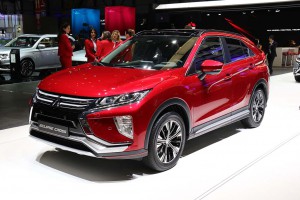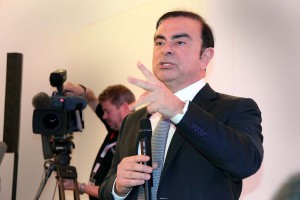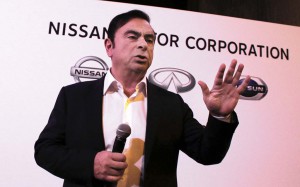After months of decline, September could bring some good news for U.S. automakers, with a modest upturn in new vehicle sales. But don’t expect that upturn to last long, warns Carlos Ghosn, CEO of the Renault-Nissan Alliance.
The Brazilian-born executive said that sales in the U.S. market are likely to remain “stable,” meaning no growth. On the other hand, he told CNBC he doesn’t expect the serious downturn that some observers have begun to worry about after months of weak sales.
Asked if there’s an opportunity for the American market to grow, following three record years of sales, Ghosn said, “I’m not planning on that,” adding that, “For the next six years we’re seeing a stable U.S. market (but) we don’t see growth in the U.S.”
The industry reached its lowest point in decades at the beginning of the decade, dropping below the 10 million sales mark in the sharpest plunge since the Great Depression. The numbers began to rebound in 2010, going on to set three consecutive annual records that saw sales reached 17.5 million last year.

Mitsubishi has helped turn the Renault-Nissan Alliance into the world's biggest automaker. The Mitsubishi Eclipse Cross concept is shown here.
But 2017 came in like a lamb, rather than a lion, and monthly sales have delivered one disappointment after another; while most observers had expected a modest slowdown, the downturn has been worse than forecast. At this point, the general consensus is that the market will barely top the 17 million mark, though September does appear to be bringing an “opportunity for the first sales increase of the year,” said Tim Fleming, an analyst with Kelley Blue Book.
(For more on September sales, Click Here.)
But that may be little more than a modest reprieve, in part fueled by the need to replace vehicles destroyed by Hurricanes Harvey and Irma.
“We’re not seeing strong growth coming from this part (North America,” Ghosn said during an interview on CNBC. “Most of the growth will come from China.” Nissan has also seen strong growth as Europe has recovered from a long recession. But the future there is clouded by Brexit and the fact that Nissan has key manufacturing operations in the U.K.
Ghosn recently relinquished his title as chief executive of Nissan so that he could take on the CEO role at Mitsubishi. Nissan took a controlling stake in the smaller Japanese automaker in 2016 after a series of scandals threatened its survival. Ghosn also remains CEO of Renault and of the Renault-Nissan Alliance formed nearly two decades ago when the French carmaker bailed out its now healthy Japanese partner.
The executive, one of the world’s best-known automotive chiefs, hopes to repeat the same restructuring at Mitsubishi that he pulled off at the main Alliance partners. The smaller Japanese company produces a range of microcars that are sold under both the Mitsubishi and Nissan names in Japan, and it has some proprietary electric vehicle technology that will now be shared with its partners. Nissan has been the world’s bigger marketer of battery-electric vehicles with the Leaf model getting a complete makeover for 2018.

Renault-Nissan CEO Carlos Ghosn said the Alliance expects to sell 14 million vehicles annually by 2022.
The company recently outlined a new five-year plan that projects substantial growth in sales of electrified vehicles. But while an early pioneer, its new strategy is not quite as aggressive as what some competitors have recently laid out. Volvo will only sell vehicles using some form of electrification as it begins to replace and add new products next year. Volkswagen will offer at least one electrified option – whether hybrid, plug-in or pure electric – for all models over the coming decade.
(Click Here to see how Renault-Nissan jumped VW and Toyota to become the world’s No. 1 automaker.)
Whether gas, diesel or electric, the Renault-Nissan Alliance has plenty of momentum going for it. Sales for the first half of the year – including Mitsubishi and Russian subsidiary Avtovaz – nudged past rivals VW and Toyota, for the first time positioning the Euro-Asian Alliance as the biggest automotive group in the world, based on unit sales.
The Alliance is expected to sell something in the range of 10.5 million vehicles for all of 2017, and its new strategy plan forecasts that will rise to 14 million by 2022.
(For more on Nissan’s new five-year plan, Click Here.)
Brexit isn’t the only trade dispute that could short-circuit the Alliance’s plans, however. The Nissan side operates a major assembly complex in Tennessee, along with two others in Mexico. All three could take a hit if, as has been threatened, U.S. President Donald Trump pulls the country out of the NAFTA trade group.
For his part, Ghosn took a conciliatory view on the North American trade pact, suggesting “NAFTA is a 20 years old agreement which needs to be adapted to reality today which is very different from what it was 20 years ago.
“But I think everybody has an interest in NAFTA,” he added. “This is a something which has been done in function, in the interests of the United States, of Mexico and Canada. So I’m very personally confident that even if there are some changes on NAFTA, NAFTA will stay because it’s in the best interest of the three countries.”

